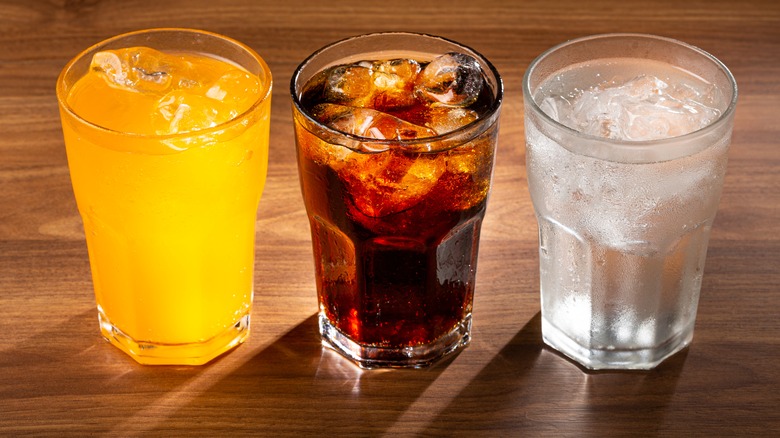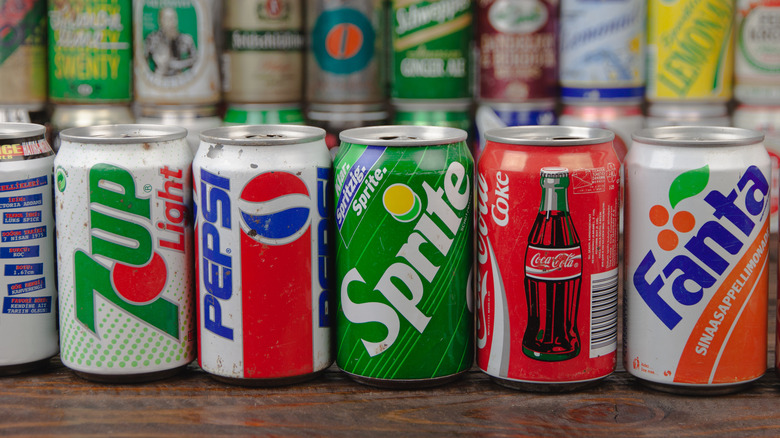Why You Should Avoid Soda If You Have An Upset Stomach
We've all had a stomach ache at some point in our lives, and we can all agree that it's an unpleasant experience. Maybe you ate too much stir-fry, or all that acidic marinara sauce on your spaghetti is what caused your upset stomach. Of course, it's also possible to not know the cause. But there's good news: An upset stomach can be treated at home by way of various foods and beverages.
However, when your tummy ache leaves you struggling to keep anything down, eating food to remedy the discomfort isn't always an option. If that's the case, drinking fluids is the next thing to consider. Losing food and water, whether it's via vomiting or diarrhea, means losing nutrients and electrolytes. According to the Mayo Clinic, losing nutrients and electrolytes leads to dehydration — and dehydration means losing energy, which leaves you feeling sluggish and weak.
There are many beverages that provide some much-needed rehydration after experiencing upset stomach symptoms, but there's one beverage in particular that you should avoid: soda. (Or pop, if you're from the Midwest.) The reason involves the basic science of carbonation and caffeine.
What exactly does soda do inside the body?
After you pop or twist open a can or bottle of soda, you hear a distinct hissing sound and might see droves of tiny bubbles rush to the surface. If you paid attention in science class, you know those tiny bubbles are made of the gas carbon dioxide — and why soda is considered a carbonated beverage. When you drink soda, you're essentially drinking gas — well, sort of, according to Live Science. After enough gas accumulates, pressure builds up in the stomach and will need to escape from somewhere. Usually, that somewhere is the mouth, in the form of a belch.
While it may be unpleasant for those around you, belching is actually a good thing (for the person belching) because it means gas is escaping the body, according to Harvard Medical School. As WebMD notes, if the gas doesn't escape, that extra pressure could lead to indigestion. The last thing you want when you already have an upset stomach is added indigestion from drinking soda, which could prompt another unwanted trip to the bathroom.
Caffeine content is another factor to consider when exploring the effects that soda has on the stomach. Coca-Cola, Pepsi, Dr. Pepper, and Mountain Dew are just a few of the brands that contain caffeine. A well-known stimulant, caffeine can cause an upset stomach (or worsen it), since it increases the amount of acid in the stomach, per Healthline.
Can flat or non-caffeinated soda provide relief for an upset stomach?
Let's first address flat soda, which is basically soda that's lost most of the carbon dioxide, according to Live Science. This eliminates the stomach pressure buildup risk, but there's still the rehydration issue to consider. If you're drinking flat soda solely to replenish lost fluids and electrolytes, your body will be left wanting. According to the World Health Organization, "carbonated drinks, flat or otherwise, including cola, provide inadequate fluid and electrolyte replacement and cannot be recommended" (via The New York Times), and consuming flat soda for an upset stomach can actually create more problems than solutions.
What about fresh, non-caffeinated soda? The University of Nebraska-Lincoln claims caffeine-free sodas like 7Up and Sprite are acceptable to drink for an upset stomach to provide rehydration. The University of Wisconsin-Madison makes the same claim, but these statements contradict The New York Times' claim above. MedicineNet reports that since many non-caffeinated drinks, like Sprite, still contain a lot of sugar, they're not the best choice for replenishing lost fluid in the body.


